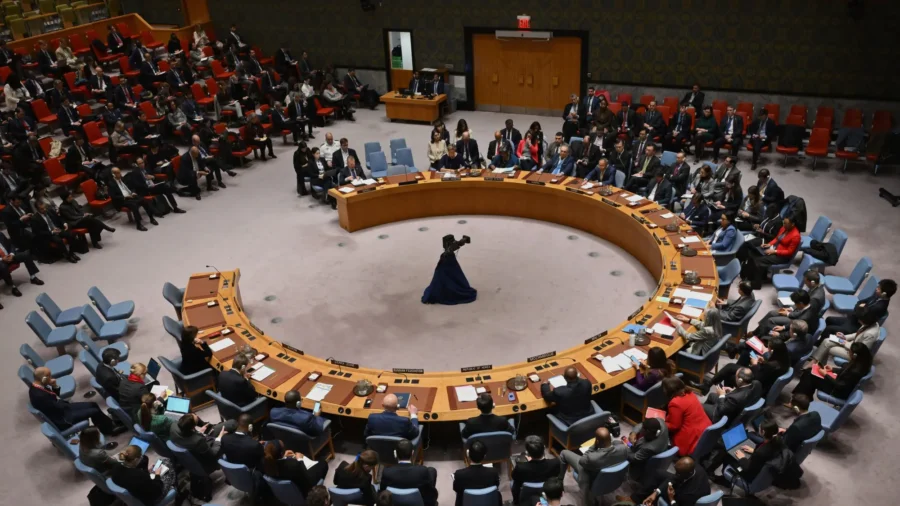The Chinese and Russian delegations at the United Nations on Friday vetoed a U.S.-led resolution that expressed a need for a ceasefire in the Israel-Hamas war in the Gaza Strip.
The U.S. delegation had announced the U.N. Security Council resolution earlier this week. A draft version of the resolution was presented before the 15-member council on Friday morning and came to a vote, with 11 member nations in support, three against, and one abstaining.
China and Russia are both among the five permanent members of the U.N. Security Council and thus have veto power over any measure before the body. Any single veto can block a resolution from moving forward.
The northern African country of Algeria was the third country to vote against the resolution, though it has now veto power of its own. The South American country of Guyana abstained from the vote.
The U.S. delegation has used its veto power to block three Gaza ceasefire resolutions previously presented to the U.N. Security Council since the start of the conflict. Russia and China had supported those prior ceasefire proposals.
Explaining his veto decision on Friday, Russian U.N. Ambassador Vassily Nebenzia said this latest U.S.-backed ceasefire resolution does not explicitly order a ceasefire, but merely states that such a ceasefire is “imperative.” Mr. Nebenzia said this language is “not enough” and the council must “demand a ceasefire.”
Mr. Nebenzia further accused the U.S. delegation of “deliberately misleading the international community” and working to satiate U.S. voters by giving them the impression of a more forceful ceasefire effort.
What Would the US Resolution Have Done?
According to a U.N. summary, the U.S. resolution “makes imperative an immediate and sustained ceasefire,” says Israel and all other armed groups in the conflict must comply with international law and protect humanitarian workers, and calls for expanded humanitarian assistance in Gaza. The U.N. summary states the resolution also directly condemns “all acts of terrorism including the Hamas-led attacks of 7 October, the taking and killing of hostages, murder of civilians, sexual violence and condemns the use of civilian buildings for military purposes.”
Additionally, the U.S.-backed resolution demands the Hamas terrorist group allow humanitarian organizations access to all remaining hostages it’s holding in the Gaza Strip.
The U.S.-led U.N. Security Council resolution comes about as the United States and some Middle Eastern nations are currently engaged in a separate set of direct ceasefire negotiations. Those negotiations appear to be focused on a limited six-week ceasefire, though President Joe Biden’s administration has said the offer could provide a framework for a more prolonged pause in the conflict. While Israeli Prime Minister Benjamin Netanyahu may be willing to pause the fighting, he has not backed away from his wartime goal to completely eradicate Hamas.
Nate Evans, a spokesperson for the U.S. Mission to the United Nations, said the resolution was “an opportunity for the Council to speak with one voice to support the diplomacy happening on the ground and pressure Hamas to accept the deal on the table.”
NTD News reached out to the U.S. State Department for more details about the ceasefire resolution but did not receive a response by press time.
Algerian U.N. Ambassador Amar Bendjama criticized the United States for vetoing its own ceasefire proposal back in February, which he said could have saved thousands of innocent lives in the Gaza Strip. Mr. Bendjama insisted the Alegerian delegation had offered some amendments to the new U.S.-backed effort, and acknowledged some of his country’s proposals had been accepted, but the latest draft still fell short.
Guyanese U.N. Ambassador Carolyn Rodrigues-Birkett said she abstained from voting on the U.S.-led resolution because it didn’t include a demand for an immediate ceasefire.
China Pushes Alternative Ceasefire Framework
Following the Friday vote, U.S. Ambassador Linda Thomas-Greenfield accused China and Russia of opposing the U.S.-led resolution for purely “cynical” and “political” reasons. She specifically criticized China and Russia for refusing to condemn Hamas for the Oct. 7 attacks and allegations Hamas members have committed acts of sexual violence. She further alleged the two countries were refusing to support the U.S.-led resolution specifically because it was drafted by the U.S. delegation.
“So, let’s be honest: for all the fiery rhetoric, we all know that Russia and China are not doing anything diplomatically to advance a lasting peace or to meaningfully contribute to the humanitarian response effort,” Ms. Thomas-Greenfield said.
Chinese Ambassador Zhang Jun said Friday that China is supporting a different draft resolution that “is clear on the issue of a ceasefire.”
Ms. Thomas-Greenfield acknowledged an alternative resolution is in the works, but said “that text fails to support sensitive diplomacy in the region.” She said the alternative resolution could also give Hamas an excuse to walk away from the ceasefire deal the U.S. side has already been pressing it to accept.
“If that alternative resolution comes up for a vote and does not support the diplomacy happening on the ground, we may once again find this Council deadlocked. I truly hope that that does not come about,” Ms. Thomas-Greenfield said.
The Associated Press contributed to this article.

